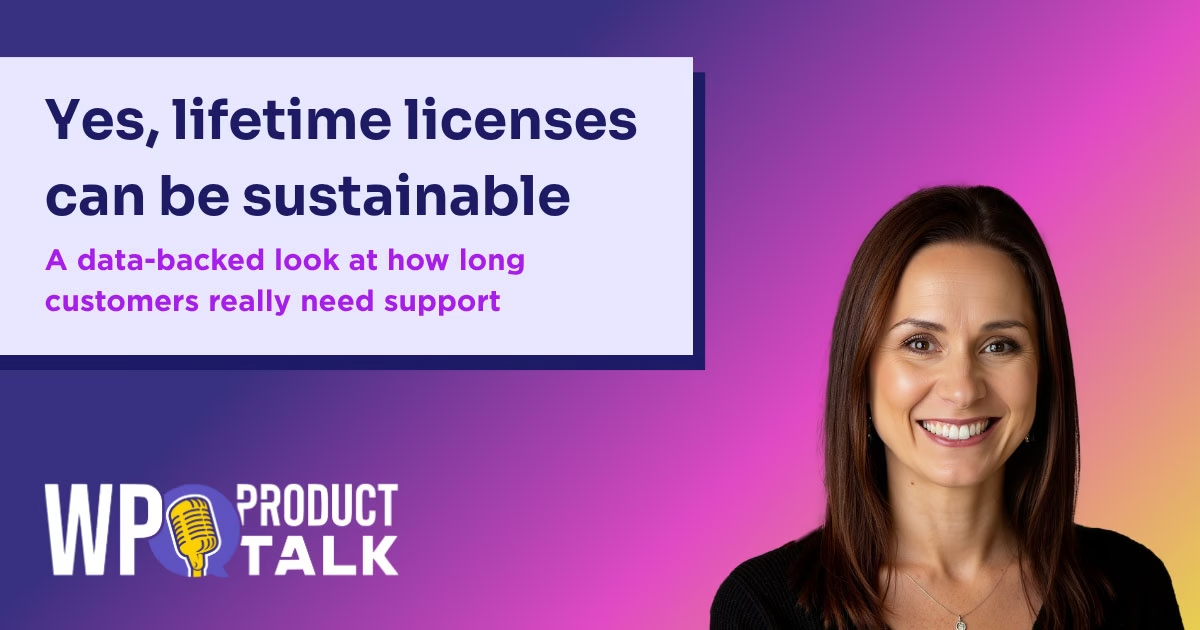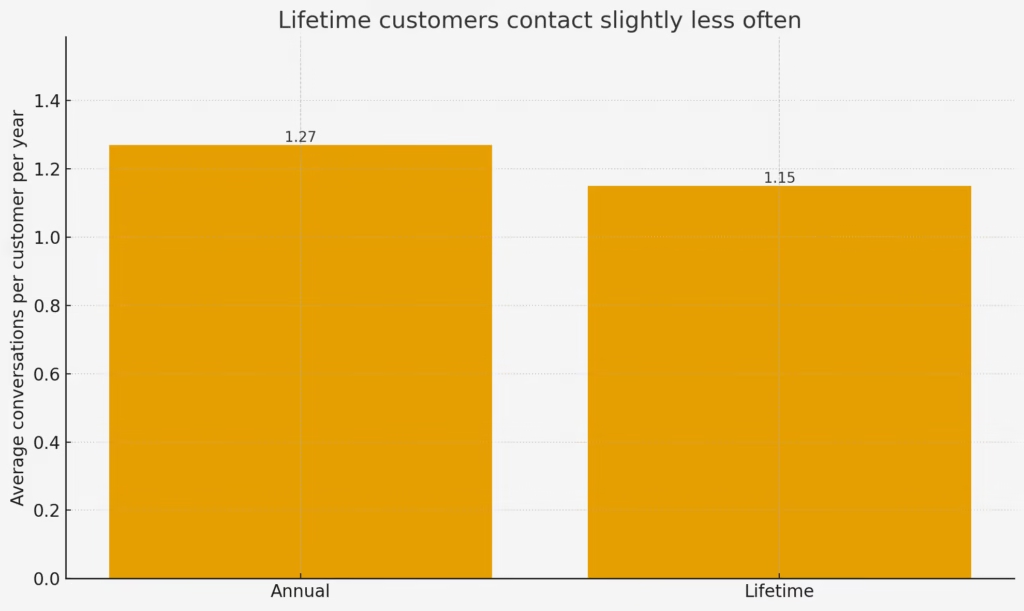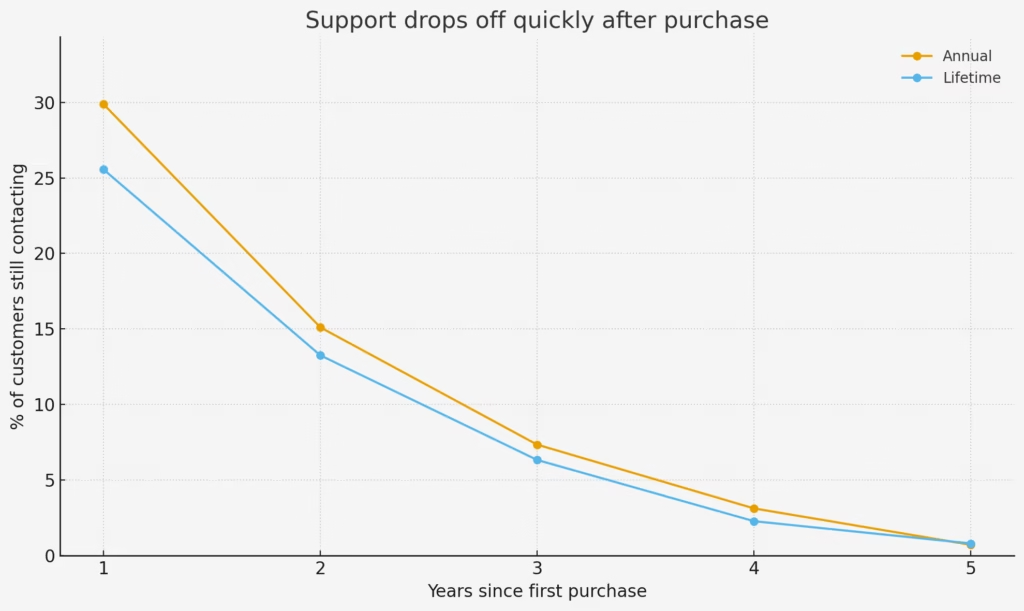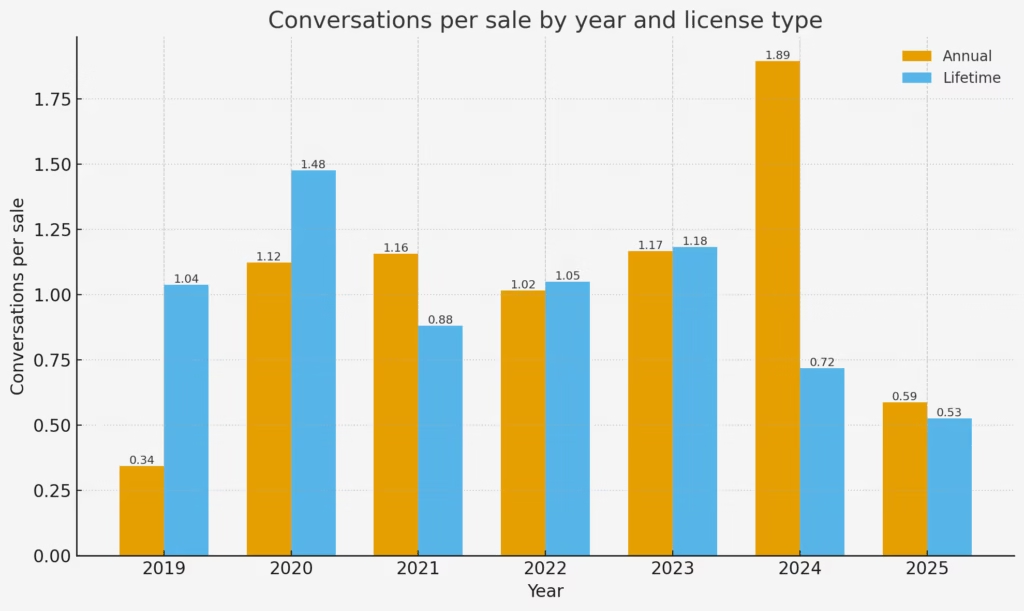Do Lifetime Licenses Really Cost More to Support? We Finally Have the Data
Lifetime licenses often get a bad reputation for being unsustainable — but are they really? I analyzed six years of Barn2’s real support data to discover how long lifetime customers actually need help, and whether the higher price truly covers the long-term cost.

Lifetime licenses have always divided opinion in the WordPress product world. Some founders see them as a dangerous promise of “support forever.” Others treat them as a healthy one-time boost to cash flow with limited long-term cost.
Until now, the discussion has mostly been guesswork. No company had shared real, long-term data showing how lifetime customers behave compared to annual ones.
Many WordPress product companies protect themselves from the perceived risk by limiting the number of years of support included in a lifetime license. Personally, I’ve always found this a bit defensive – and self-defeating. If you call it a lifetime license, then customers should reasonably expect lifetime support.
During a recent episode of WP Product Talk about the pros and cons of lifetime licenses, I decided it was time to find out. I wanted to find out whether the fear of supporting lifetime customers is justified, or whether support demand naturally tapers off enough to make lifetime licenses both fair and sustainable.
To find out, I analyzed 6 years of Barn2’s sales and customer support data. And the results are in 📊
The question we wanted to answer
Barn2 offers both annual and lifetime licenses for our WooCommerce plugins.
The big questions:
- Do lifetime customers open more support tickets?
- Do they keep contacting for longer?
- Are our current lifetime prices (currently 3.5–4× annual at Barn2) sustainable when we account for real support behaviour?
We already knew that the average annual customer lifespan is around 2.5 years, meaning 3× pricing would theoretically cover the same period. We therefore always felt safe by charging 3.5-4x. But I wanted to know whether that hold ups in practice once you add real support data.
How we gathered the data
We connected six years of Help Scout conversation data with our actual license records from Easy Digital Downloads.
Each record was tied to:
- A unique customer identifier.
- License type (annual or lifetime).
- Their first purchase date.
- The date of every support conversation.
We removed:
- Pre-2019 customers (before lifetime licenses existed).
- Pre-purchase enquiries.
- Customers with less than 180 days of account history, to avoid skewing results toward new buyers.
The final dataset contained about 17,000 real customers and 77,000 support conversations between 2019 and 2025.
To add context, we also looked at how many of each license type we sold each year:
| Year | Lifetime sales | Annual sales |
|---|---|---|
| 2019 | 158 | 4,477 |
| 2020 | 705 | 6,178 |
| 2021 | 771 | 5,761 |
| 2022 | 678 | 5,958 |
| 2023 | 423 | 7,413 |
| 2024 | 398 | 2,955 |
| 2025 | 253 | 3,943 |
What we measured
We looked at three questions:
- Support frequency – how often each customer contacts support per year.
- Support duration – how long customers continue opening tickets after their first purchase.
- Sales context – how the number of customers in each group affects total support load.
The results
1. How often customers contact support

Lifetime customers contact support slightly less frequently than annual ones. A lifetime customer typically only opens about one ticket per year.
2. How long they keep contacting us

Support demand falls sharply after the first few months.
Only around one in seven customers — annual or lifetime — ever open a ticket after two years.
By year five, fewer than 1% are still contacting support.
3. What happens when you factor in sales volume
Lifetime licenses make up only 5–10% of Barn2’s total sales each year.
Even when you account for their smaller volume, lifetime customers generate just 10–15% of total support conversations.
There’s no sign that they’re heavier users overall. In most recent years, the opposite has been true — lifetime customers have required less support per sale than annual customers.

What this means for pricing
Support demand for both annual and lifetime licenses is front-loaded.
The vast majority of tickets arrive within the first few months after purchase, when customers are installing or configuring the plugin. After that, almost everyone stops needing help — regardless of whether they bought a lifetime or annual license.
That means lifetime support isn’t a long-term liability. The data shows that the cost of supporting lifetime customers is similar (or lower) than supporting annual customers for 2–3 years.
At Barn2, our current lifetime pricing of 3.5–4× annual comfortably covers long-term support. Even a 3× multiplier would likely be sustainable, although we intentionally price higher as a disincentive and to prioritize recurring revenue.
It’s also worth noting that some lifetime buyers purchase collections of plugins during sales but never actually use them. Those customers will never contact support, which naturally lowers the average for lifetime users. However, this behaviour is part of the real-world economics of lifetime licenses — many buyers value the long-term access and flexibility more than they value immediate use. The data therefore reflects the true cost to the business, not an anomaly.
How this might differ for other product types
Barn2 sells feature-specific plugins that users typically configure once and rarely revisit. For these kinds of products, lifetime licenses are relatively low-risk.
But not every product behaves the same way.
Companies with platform-level products — e.g. themes, page builders, membership or LMS plugins — may see customers return for ongoing help over many years. Similarly, if you sell lifetime deals to agencies who use your product across client sites, you’ll probably see longer-term support patterns.
If you sell very different WordPress products from Barn2, I recommend that you analyze your own data before assuming that your lifetime licenses will behave like ours.
Conclusion
After analysing thousands of real customers across six years, we found no evidence that lifetime licenses cost more to support or stay active for longer. In practice, they behave almost exactly like annual customers — only fewer in number and slightly quieter.
For companies selling niche WordPress plugins, lifetime licenses can be both sustainable and fair when priced around 3–4× annual (or even less, if you prefer).
The fear of “support forever” just doesn’t match the data.